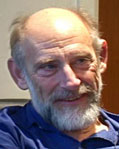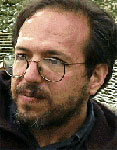They fought via email, then agreed to each write a final letter on the edge. And today you can read the final judgment right here at the source from somebody who is little prejudiced by his own hidden agenda, which is by the way one of the main charges that Susskind

repeatedly throws at Smolin,

without realizing that it is actually mainly he himself who commits such.
The argument is mainly (length wise, but also in a sense only on the surface while the deeper issue is another one, thus the ongoing popularity of that 2004 debate) about what is more efficient in producing a large number of universes that “populate the multiverse”: Smolin likes Darwinian evolution involving black holes, so called cosmological natural selection (CNS); Susskind loves eternal inflation involving the spawning of pocket universes.
Such arguments make perfect sense if there is some sort of normalizable statistical ensemble given, i.e. some sort of playground that comprises 100 percent of all cases, the total that has unit
probability. In front of such a background, you can count the improbability of whatever you seem important enough to care about, say a carbon rich chemistry in order to have conscious observers or many black holes of a certain type.
High time for a concrete example: Given is a planet and all its molecules and different environments of wet and cold, dry and hot, high or low pressure, and so on. Or given are maybe all the planets in a galaxy. Now it makes perfect sense to ask for a mechanism that explains why there are complex systems, like humans for example, that naively expected may be very unlikely to develop at all, say by pure chance. On such a background, discussing the efficiency of different mechanisms makes perfect sense.
We need to firstly understand the futility of their argument from a philosophical perspective: Both, black holes and pocket universes alike, are proliferated in an infinite amount, so any and all asking for more habitable universes is beside the point. Given an infinite amount, there is no point in being common. You can be rare and “uncommon”, but once infinity comes in, you will still occur an infinite amount of times. Even if eternal inflation would give (say per absolute quantum time) an infinitely larger amount of universes than a competing black hole procreation mechanism, both mechanisms give the exact same number of universes where I am writing this blog: infinite.
This is by the way the reason why quantum physics is somewhat stuck right now: the multiverse is mistaken as direct realism, the kind of realism any philosopher rejects, even the realist ones! Realists are nowadays mostly “structural realists”. “The ultimate ensemble theory” by Max Tegmark and others is philosophically naïve realism. Such direct realism produces good physical theories in the everyday practice of most physicists trying to model some small domain, but it cannot be a good final unification, a theory of everything.
In the argument between Smolin and Susskind, a certain version of the anthropic principle plays a large role, namely the principle of mediocrity developed heavily by Garriga and Vilenkin, which states that "our civilization is typical in the ensemble of all civilizations in the universe". Smolin is to be recommended for making this an issue, as he is not just assuming some random ensemble but actually insists on that you have to be careful about what kind of ensemble you create before you analyze it [Lee Smolin, "Scientific alternatives to the anthropic principle", hep-th/0407213]. He himself fails at the task, but he at least understands the problem. I.e., the ensemble is not just the real multiverse out there, but something you construct in such a way as to be able to do proper science with it. Susskind does not (want to?) acknowledge this.
Next time, I will start with ripping on Smolin, Part III will rip on Susskind, and part IV will announce the winner as if anybody cares.



Comments